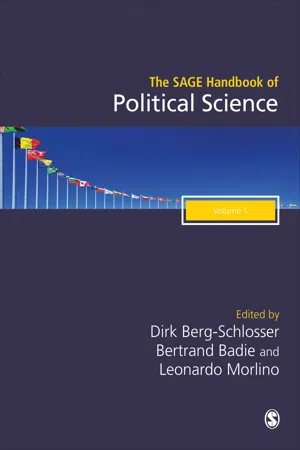
The SAGE Handbook of Political Science
- 1,776 pages
- English
- ePUB (mobile friendly)
- Available on iOS & Android
The SAGE Handbook of Political Science
About This Book
The SAGE Handbook of Political Science presents a major retrospective and prospective overview of the discipline. Comprising three volumes of contributions from expert authors from around the world, the handbook aims to frame, assess and synthesize research in the field, helping to define and identify its current and future developments. It does so from a truly global and cross-area perspective
Chapters cover a broad range of aspects, from providing a general introduction to exploring important subfields within the discipline. Each chapter is designed to provide a state-of-the-art and comprehensive overview of the topic by incorporating cross-cutting global, interdisciplinary, and, where this applies, gender perspectives. The Handbook is arranged over seven core thematic sections:
Part 1: Political Theory
Part 2: Methods
Part 3: Political Sociology
Part 4: Comparative Politics
Part 5: Public Policies and Administration
Part 6: International Relations
Part 7: Major Challenges for Politics and Political Science in the 21st Century
Frequently asked questions
Information
Table of contents
- Cover
- Half Title
- Editorial Board
- Title Page
- Copyright Page
- Contents
- List of Figures and Tables
- Notes on the Editors and Contributors
- Preface
- Introduction
- Part I Political Theory
- 1 Comparative Political Theory
- 2 Constructivism
- 3 Emile Durkhein's Sociological Insight Into Political Phenomena
- 4 Economic Analysis in Political Science
- 5 Functionalism and Its Legacy
- 6 Feminist Political Science
- 7 Marx and Marxism in Politics
- 8 The New Institutionalism in Political Science
- 9 How to Understand Normative Political Theory
- 10 Political Anthropology and Its Legacy
- 11 Uses and Abuses of Formal Models in Political Science
- 12 Postmodernism Past, Present and Future
- 13 David Easton's Political Systems Analysis
- 14 Max Weber and the Weberian Tradition in Political Science
- Part II Methods
- 15 The Survival and Adaptation of Area Studies
- 16 Big Data in Social Sciences
- 17 Case Studies and Process Tracing
- 18 Causation
- 19 Concept Regulation in Political Science
- 20 Configurative Methods
- 21 Designing a Research Project1
- 22 Experiments
- 23 Historical and Longitudinal Analyses
- 24 Interpretative Methods
- 25 Methodology: Qualitative and Quantitative Approaches1
- 26 Mixed Method and Multimethod Research and Design
- 27 Ontologies, Epistemologies and the Methodological Awakening1
- 28 Survey Research
- Part III Political Sociology
- 29 Clientelism
- 30 Elites
- 31 Identities
- 32 Interest Group Systems in the Age of Globalization
- 33 Parties
- 34 Pluralism
- 35 Political Behavior
- 36 Political Communication
- 37 Political Cultures
- 38 Political Socialization
- 39 Social Movements
- 40 Social Structure
- Part IV Comparative Politics
- 41 Political Accountability
- 42 Authoritarianisms and Authoritarianization
- 43 Democracies
- 44 Electoral Systems
- 45 Executive Power
- 46 Federalisms1
- 47 Hybrid Regimes
- 48 Judicial Power
- 49 Legislative Power
- 50 Legitimacy and Legitimation
- 51 Political Competition
- 52 Regime Change
- 53 Religion and Politics
- 54 Responsiveness
- 55 Political Performance and State Capacity
- 56 State Formation and Failure
- Part V Public Policies and Administration
- 57 Bureaucracy and Bureaucratic Effectiveness
- 58 Corruption
- 59 Governance
- 60 Implementation
- 61 Informal Governance and Participatory Institutions
- 62 Local Politics
- 63 Policies beyond the State
- 64 Politics and Policy
- 65 Policy Evaluation1
- 66 Policy Instruments
- 67 Policy Learning
- 68 Policy Making: Models
- 69 Regulation
- 70 Welfare State
- Part VI International Relations
- 71 Diplomacy
- 72 Foreign Policy Analysis
- 73 Globalization
- 74 International Political Economy
- 75 International Political Theory
- 76 International Relations Theory1
- 77 Multilateralism
- 78 The New Wars
- 79 In Search of the Non-Western State: Historicising and De-Westphalianising Statehood
- 80 Regionalism
- 81 State, Power and Security
- 82 Transnational Relations as a Field
- 83 War and Peace
- Part VII Major Challenges for Politics and Political Science in the 21st Century
- 84 Changes of International Power Relations
- 85 Environmental Changes
- 86 Human Rights and Humanitarian Interventions in the International Arena
- 87 International Migration
- 88 International Violence
- 89 Minorities: Empirical and Political-Theoretical Reflections on a Cunning Concept
- 90 Populism
- 91 Outcomes after Democratic Transitions in Third-Wave Democracies*
- 92 New Wars in the Global South
- Glossary
- Index